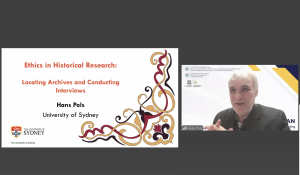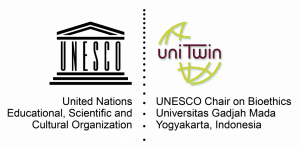Learning History: A Crucial Foundation for an Ethical and Sustainable Future

Yogyakarta, 16 July 2025 – In a rapidly changing world, studying history is not just about remembering the past, but also about understanding the direction of our future. History offers us essential lessons—particularly in ethics, justice, and humanity. The principle of “Jas Merah” (an Indonesian acronym for “Never Forget History”) is especially relevant to this edition of Raboan Research and Perspective Sharing, which raised the theme “Ethical Considerations in Historical Research: Locating Archives and Conducting Interviews.” This session featured Professor Hans Pols from the University of Sydney and was moderated by Ns. Wahyu Dewi Sulistyarini, M.S.N., from CBMH UGM.
Prof. Hans emphasized that history is no longer solely told from the perspective of those in power or from elite narratives. Today, it also serves as a space to amplify voices that have long been marginalized—such as those of women, laborers, and ethnic minorities—offering us a broader and more just understanding of the past.
He also highlighted the vital role of archives as key sources of information about past events and figures. However, working with archives also presents ethical challenges. For example, colonial-era Dutch newspapers archived on Delpher.nl contain rich data but are written in Dutch and largely reflect a colonial viewpoint. This makes it all the more important to balance such sources with materials that represent diverse Indonesian perspectives, including oral histories that are more inclusive and sensitive to cultural and social diversity.

According to Prof. Hans, ethics in historical writing means having the courage to explore stories that are unusual, overlooked, or hidden within the “silences” of history. It also means ensuring that history—through books, journals, and digital databases—can be accessed by everyone, regardless of background or academic privilege.
This topic closely aligns with several Sustainable Development Goals (SDGs), particularly SDG 4: Quality Education, by promoting a critical and inclusive understanding of the past, SDG 10: Reduced Inequalities, by highlighting stories from marginalized communities, SDG 16: Peace, Justice, and Strong Institutions, by uncovering the roots of injustice and fostering transparent, equitable governance.
By learning from the successes and failures of the past—whether in managing resources, fostering social development, or upholding justice—we can craft wiser, more ethical, and more inclusive pathways for the future. A future that values not only progress but also fairness, diversity, and shared humanity.
Reporter: Ika Setyasari, S.Kep.Ns., M.N.Sc
Editor: Alvira Rahmasari, S.H.G.

Follow us